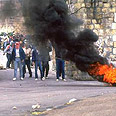
Intifada means war
Op-ed: Notion of Intifada allows Palestinians to justify violence while using victimhood card
The Arabic term Intifada connotes awakening or uprising and was first used during the 1987 uprising against Israel. It is also used in the Palestinian narrative in the sense of “to shake up or wake up” the world and Israel to all the wrong that was done to the Palestinians as a result of the Israeli “occupation.”
Practically, this idea, that any means including violence may be used in the face of “occupation” has given Palestinians the carte blanche to do whatever they want whenever they want with no consequences for their actions.
Yasser Arafat’s ultimate goal in his day was to make the Palestinian cause the flagship for the Arab world at large. Until the Palestinians receive the justice they are divinely owed, the theory went, the Arab world should not rest. Over the years, the Palestinian cause has been used by many Arab regimes and Islamist groups like al-Qaeda and others as a public relations tool to galvanize their respective causes without really intention of helping the Palestinians.
Historically, the first Intifada began in 1987. The second so-called al-Aqsa intifada took place in 2000, and now according to a Facebook page the third Intifada is scheduled to erupt on May 15 - the Palestinian Nakba Day – the catastrophe day. This is the Palestinian interpretation of Israel’s creation in 1948.
With the ongoing upheaval in the region from Tunisia and Egypt to Bahrain, Yemen, Libya, and now even Syria, the Palestinians have no plan to sit idly by and not join the party. In the past, the Intifada was the vehicle to unite and bind Palestinians to their Arab/Muslim brethren. Recently, Hamas praised Tunisia’s Intifada and the overturning of the corrupt Ben Ali regime. Hamas went as far as saying that the Tunisian Intifada was a “milestone in contemporary Arab history”, and asserted that injustice can only be countered with sacrifice.
This language is an excellent illustration of Arafat's legacy, the Palestinianization of the Arab/Muslim world.
Intifada in academia
Intifada is not limited to the Middle East but has penetrated the halls of US academia. This is demonstrated by individuals like Hatem Bazian, an Arabic lecturer at the University of California, Berkeley who following the War in Iraq stated that “it’s about time that we have an Intifada in this country that changes fundamentally the political dynamics in here.” There is also Yvonne Yazbeck Haddad, a professor of the History of Islam and Christian-Muslim Relations at Georgetown University, who explained simply that, “Intifada is something that Muslims and Palestinians all approve of. It means ‘just get off my back’.”
No one should doubt that Intifada has violent terroristic goals that have been demonstrated by the level of violence used against Israelis since the first and second Intifadas. As a mechanism that justifies all violence in the name of “resistance,” the Intifada has allowed continued violence, including the latest rampage of killings of innocent Israelis in Itamar and now in Jerusalem. One of the mistakes Israel has made is adopting the phrase itself to describe its ongoing conflict with the Palestinians. By adopting an Arabic phrase with clear goals into Israeli political and cultural vernacular Israel has, in effect, legitimated the Palestinian point of view.
One result is that the violent asymmetrical war Israel has been fighting for the past 24 years has been relegated to an “uprising,” which implies that the means are justifiable, instead of a full blown war.
Internally, Israel's government understands that Palestinians are conducting a war but for unclear reasons it simply declines to call it what it is. Even now, key Israeli government figures like former Shin Bet chief and now Knesset member Avi Dichter have been warning against a third Intifada. Dichter is wrong. “Shaking up” does not include cutting children's throats; terrorist wars do.
The cycles of Intifada have been more beneficial to Palestinians than their so-called quest for Palestinian statehood. Intifada allows Palestinians to use and justify violence whenever necessary, and to use the victimhood card as needed. By continually harping on “occupation,” Palestinian victims automatically explain and justify moral depravity of violence as not only exceptional but legitimate. In turn, regional Intifadas only validate the ongoing Palestinian one.
Whether or not the increasing violence against Israel will be called a "third Intifada" or something more honest, until Palestinians choose a different vehicle Israel will be forced to combat their violence in a way that leaves no room for interpretation.
Asaf Romirowsky is a Philadelphia-based Middle East analyst, a lecturer in history at Pennsylvania State University and an adjunct scholar at the Middle East Forum
- Follow Ynetnews on Facebook










